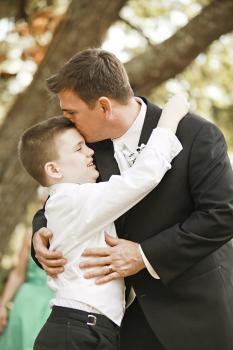 Parenting is never easy — throw in a child with special needs, and it just got a whole lot more complicated. Parenting a child diagnosed with autism can be exhausting, frustrating and lonely. Wanting to find a partner to share that with, to find someone who will love you and be there and make you laugh, isn’t unreasonable. Doing it, though, can be hard.
Parenting is never easy — throw in a child with special needs, and it just got a whole lot more complicated. Parenting a child diagnosed with autism can be exhausting, frustrating and lonely. Wanting to find a partner to share that with, to find someone who will love you and be there and make you laugh, isn’t unreasonable. Doing it, though, can be hard.
Autism is a spectrum of developmental delays, social and communication impairments, and unusual interests or behaviors. According to the CDC 1 in 54 children are diagnosed with autism. When you initially hear the ASD diagnosis, you may feel anxious, overwhelmed, and unprepared, because you don’t know what to do or expect.
Here are 10 things you can do if your child is diagnosed with autism.
Advocate for your child
When my son was diagnosed, his pediatrician said to me, “Be your child’s advocate, his future depends on that.” You are the voice for your child, without you, your child may not get the help that he or she needs. Communicate with your child’s therapist, neurologist, developmental specialist, teacher(s), and/or caregivers if you have questions or concerns about your child. You need to speak up if you notice things like your child regressing in their developmental abilities.
Learn about ASD
There are many autism magazines, books, blogs, and videos that will give you parenting tips and advice to help you be more informed about ASD. The more you know the more successful that your child will be. I was blessed and fortunate enough to recognize early warning signs and began learning about ASD before he was diagnosed.
Educate others
Educate friends, caregivers, teachers, and family about what your child is going through and make them aware of what their condition means, so they understand what you are going through and can offer support. When you educate people about ASD, they are less inclined to change them and more inclined to accept who they are, quirks and all.
Understand your child’s behaviors
Your child may use nonverbal cues or repetitive movements to communicate with you, like pacing back and forth, spinning in circles, or flapping their arms. Understanding your child’s behaviors will give you insight on what comforts them, what triggers disruptive behavior, what they are sensitive to, and when they are hungry, upset, or tired.
An Example: My son is nonverbal, and doesn’t have the concept of pointing at what he wants. Instead, he pulls me to certain rooms. Nudging me to the kitchen means he’s hungry, his bedroom means he’s tired and the bathroom means he wants to take a bath.
Create a routine and be consistent
You will hear this over and over again, your child needs a strict schedule or routine more so than a neuro-typical child. Autistic children need consistency. Some experts say that they crave consistency because they perform better when they have a consistent routine for meals, therapy, school, bedtime, and other activities. A minor change could mean your child won’t eat, may have a meltdown, or will fight to go to sleep.
Build a support network
It is important to have a support network, to lean on when you feel burnt out or overwhelmed. If you have a school-aged child with autism get involved with the school. Search online for support groups that can offer tips on how to deal with things. It is okay to get frustrated or want to pull out your hair, however, you need to know when to seek help and get the support you need.
Get involved in the community
Being involved in the community is a great way to meet other parents, and introduce your child to new things. Find different activities that you can get your child involved in so that he/she knows there’s a world outside of therapy and home. Getting involved with a church or religious organization in your area is a good way to have your child interact with other children and get involved with trying new activities.
Utilize your resources
You need to know where to go for special education services, and what type of early intervention and government services that are available for children with autism. Depending on your child’s age, government assistance programs provide you with assistance for counseling, therapy, and more. If your child is under the age of 3 or 4 many areas offer at no-cost, an Early Intervention program that leads to an Individualized Education Plan (IEP).
Create a safe place for your child
When your child is overstimulated, you need to have a safe place for them. Children with ASD need and prefer their own space. Somewhere they can go to get away from others. A safe place is where they can comfort themselves.
Take care of yourself
It is understandable that you are exhausted, and overwhelmed because raising any child let alone an autistic one can be challenging. But you need to make sure you take care of yourself, this includes going to doctor appointments for you and having time to yourself. Your child needs you at your best, who else is going to advocate for them, and help them succeed in life?


